This at-home test provides valuable insights into your cholesterol and inflammation levels, helping you to understand your risk of plaque buildup, heart attack, and stroke.
-
13 biomarkers measured
-
CLIA-certified and CAP-accredited lab
-
Finger prick sample
-
Fasting
-
Virtual Care available
What is measured?
This test measures the following biomarker:
-
Total cholesterol
Cholesterol is a lipid that is found in the blood. It comes from food that you eat and is also manufactured in the liver. Total cholesterol is comprised of various different types of cholesterol including low-density lipoprotein (LDL), high-density lipoprotein (HDL), and very-low-density lipoprotein (VLDL) cholesterol. Cholesterol is a fatty substance essential for building cells and producing many hormones. When levels are elevated, excess cholesterol is deposited into the blood vessels and is associated with heart disease and stroke.
-
HDL
High density lipoprotein (HDL) is often referred to as the "good" cholesterol. It removes LDL ("bad cholesterol") from your arteries and takes it to the liver where it is metabolized or broken down into bile acids and excreted from the body in the bile. Elevated HDL is generally considered protective against heart disease and stroke, however extremely high levels can also be problematic. Low levels increase risk of heart attack and stroke due to buildup of excess LDL in the blood vessels.
-
LDL
Low density lipoprotein (LDL) is often referred to as the "bad" cholesterol. It is produced in the liver and is deposited into the tissues where it is used to build cell membranes and hormones. Elevated LDL comes from your genetics and your diet. Eating saturated and trans fats will increase LDL levels. When oxidized, LDL is deposited into the arteries where it creates plaque and contributes to heart disease and stroke. Low LDL is associated with inflammation and increased risk of cancer and mood disorders.
-
Triglycerides
Triglycerides are a type of fat found in the bloodstream. Triglycerides are produced by the body from the food we eat and are also stored in fat cells for later use as energy. While triglycerides are essential for normal body function, high levels can increase the risk of heart attack and stroke. Extremely elevated levels are associated with pancreatitis, metabolic syndrome and type 2 diabetes.
-
LDL/HDL ratio
The LDL/HDL ratio measures the balance between low-density lipoprotein (LDL) cholesterol, or "bad" cholesterol, and high-density lipoprotein (HDL) cholesterol, or the "good" cholesterol. This ratio provides a more comprehensive assessment of your cardiovascular risk than individual cholesterol levels alone. A higher ratio indicates a greater risk of heart disease and stroke. Elevated LDL levels contribute to plaque buildup in the arteries while higher HDL levels help remove cholesterol from the bloodstream.
-
Cholesterol/HDL ratio
The CHOL/HDL ratio is a measurement derived from dividing the total cholesterol (CHOL) level by the high-density lipoprotein (HDL) cholesterol level. This ratio helps assess cardiovascular risk, as a higher ratio indicates a greater risk of heart disease, while a lower ratio suggests a lower risk.
-
VLDL
VLDL is a type of lipoprotein made by the liver. VLDL is composed of a protein, cholesterol and triglyceride molecule combined together. VLDL is transported to the body and blood vessels where triglycerides are removed from the VLDL leaving an LDL cholesterol molecule. At high levels, VLDL can contribute to the buildup of plaque in the arteries leading to heart disease, and stroke.
-
Homocysteine
Homocysteine is an amino acid produced in the body during the metabolism of a dietary amino acid called methionine. Elevated homocysteine has been associated with an increased risk of cardiovascular disease including coronary artery disease and stroke. Homocysteine levels can be influenced by genetic factors, dietary intake of vitamins B6, B12, and folate, and certain medical conditions such as chronic kidney disease, thyroid disorders, and conditions that cause malabsorption.
-
hsCRP
hsCRP is a marker of inflammation and risk of heart disease and stroke. hsCRP is elevated with inflammation in autoimmune diseases, infection, smoking, obesity, high carb and high processed food diets, and with cardiovascular diseases. hsCRP is one of the most sensitive, simple and affordable tests to determine your risk of cardiovascular diseases such as heart attack and stroke; even when you have no symptoms. Even very slight increase in hsCRP levels above normal can increase your risk of heart attack and stroke.
-
ApoA-I
Apolipoprotein A1 (ApoA-I) is the main protein component of high-density lipoprotein (HDL) cholesterol, also known as "good cholesterol." ApoA-I carries excess cholesterol from blood vessels and transports it to the liver for excretion or recycling. Elevated ApoA-I is generally protective by removing and preventing cholesterol buildup in the vessels of the heart, brain and body. Low levels indicate higher risk of heart attack and stroke due to decreased ability to remove cholesterol deposits from the blood vessels.
-
ApoB
Apolipoprotein B (ApoB) is a protein that is produced in the liver where it is combines with cholesterol and other fats to make VLDL cholesterol. It is carried from the liver to the body and blood vessels where it is converted to LDL cholesterol and is deposited into the tissues and blood vessels. Elevated ApoB usually also means elevated LDL and an increased risk of cardiovascular disease. This test is particularly useful for evaluating the risk of heart disease and stroke.
-
ApoB/ApoA-I ratio
The ApoB/ApoA-I ratio reflects the balance between the primary protein component of LDL (ApoB) to the HDL cholesterol protein component (ApoA-I). The higher the ratio, the higher the risk of atherosclerotic cardiovascular disease. This reflects the role of LDL in increasing plaque buildup in the blood vessels which contributes to heart disease and stroke.
-
Lipoprotein A
Lipoprotein(a), or Lp(a), is a lipoprotein that transports cholesterol from the liver to the rest of the body. It is composed of LDL-like particles, apolipoprotein A particles, and ApoB-100 particles. When elevated, Lp(a) increases the risk of cardiovascular diseases such as heart attack and stroke more than any other lipid does. Lp(a) is thought to contribute to hardening of and build up of plaque in the blood vessels. Elevated Lp(a) is familial. Twenty to 30% of people have an elevated Lp(a), though testing for Lp(a) is seldom done. Lp(a) tests are measured either in milligrams per deciliter (mg/dL) or in nanomoles per liter (nmol/L). Both are effective ways to measure Lp(a). When converting md/dL to nmol/L, you can use a multiplier of approximately 2.21 times the mg/dL to get the number of nmol/L.
Who should take this test?
This test is suitable for adults of all ages, but it's particularly important for:
- Men and women ages 18 and over as cholesterol levels can increase with age, putting everyone at risk
- Individuals with risk factors, including those with a family history of heart disease, stroke, high cholesterol, diabetes, or obesity
- People concerned about their heart health
How to test?
Before you begin:
- Fast overnight for 12 hours and take the test in the morning.
- When you wake up, drink 12oz. of water and collect your blood sample 1 hour later.
- Avoid smoking for 1 full hour before collecting your blood sample.
- Wash your hands with soap in warm water, and then rub them together.
- Do some light exercise, like jumping jacks, to increase blood circulation.
Register your test ID online and collect your sample:
Scan the QR code inside your kit and follow the instructions to collect your sample.
After collection:
- Let your sample dry completely on card (2 hours).
- Mail test box the same day using the prepaid label. If you take your test on Sunday, mail it in first thing on Monday.
Pre-Testing Video
What is in the box?
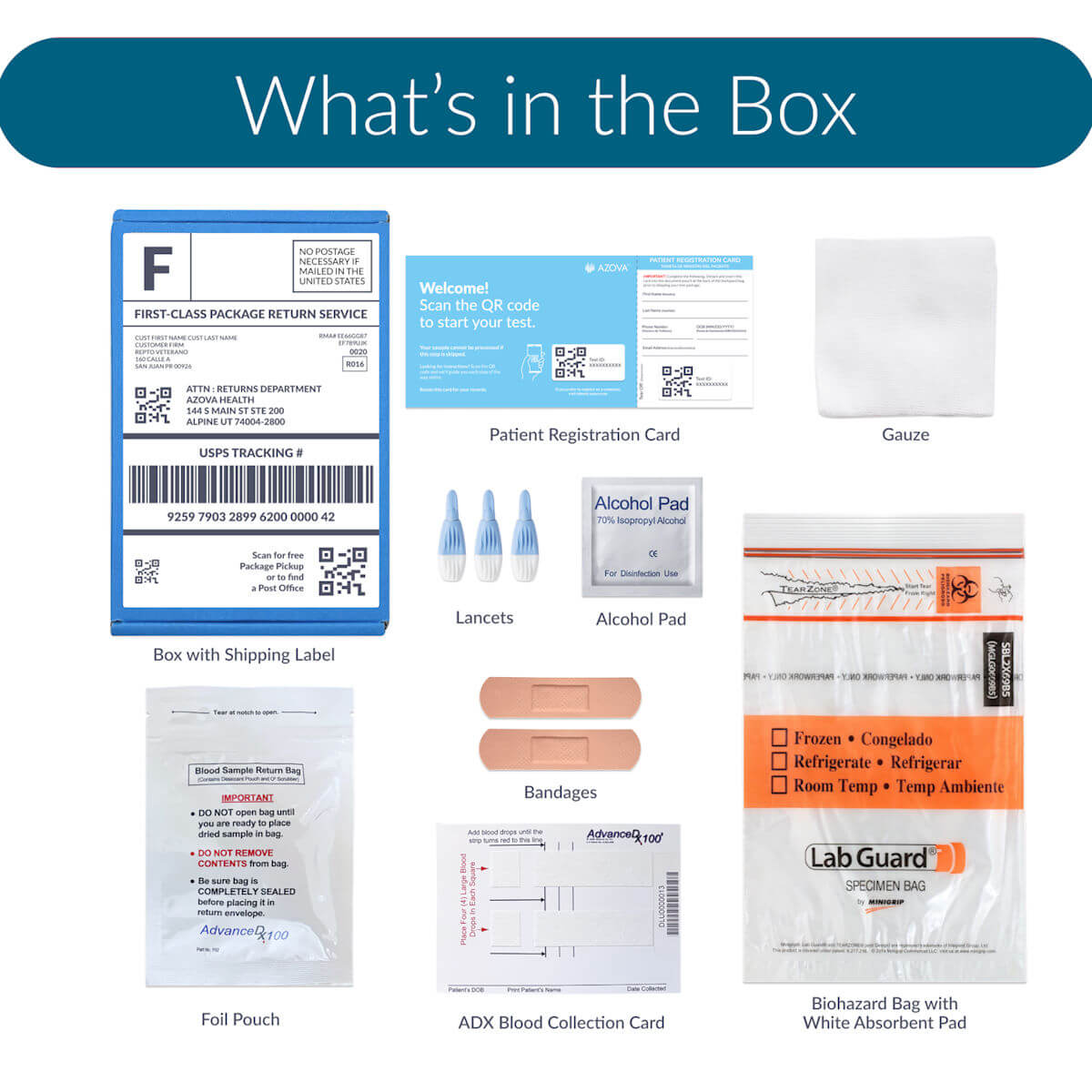
What to expect?
- Prepaid shipping label and packaging for an easy return to the lab
- All the necessary materials for sample collection
- Live 24/7/365 proctoring to guide you through the sample collection process
- Easy-to-follow video directions to help you along the way
- Digital (and printable) results found in the AZOVA app
The HEALTHBOX™
Complete Heart Health and Inflammation Test
Complete Heart Health and Inflammation Test
2-5 days
Couldn't load pickup availability
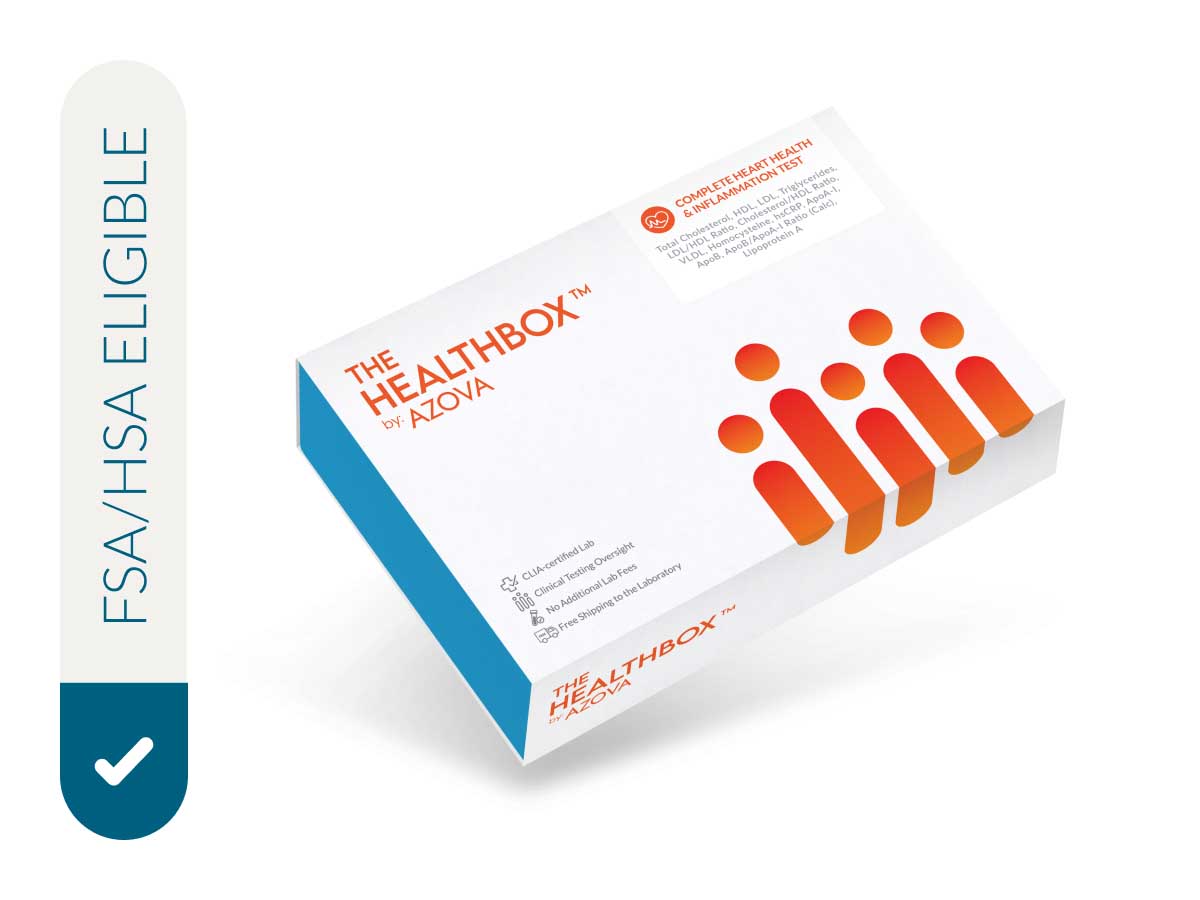
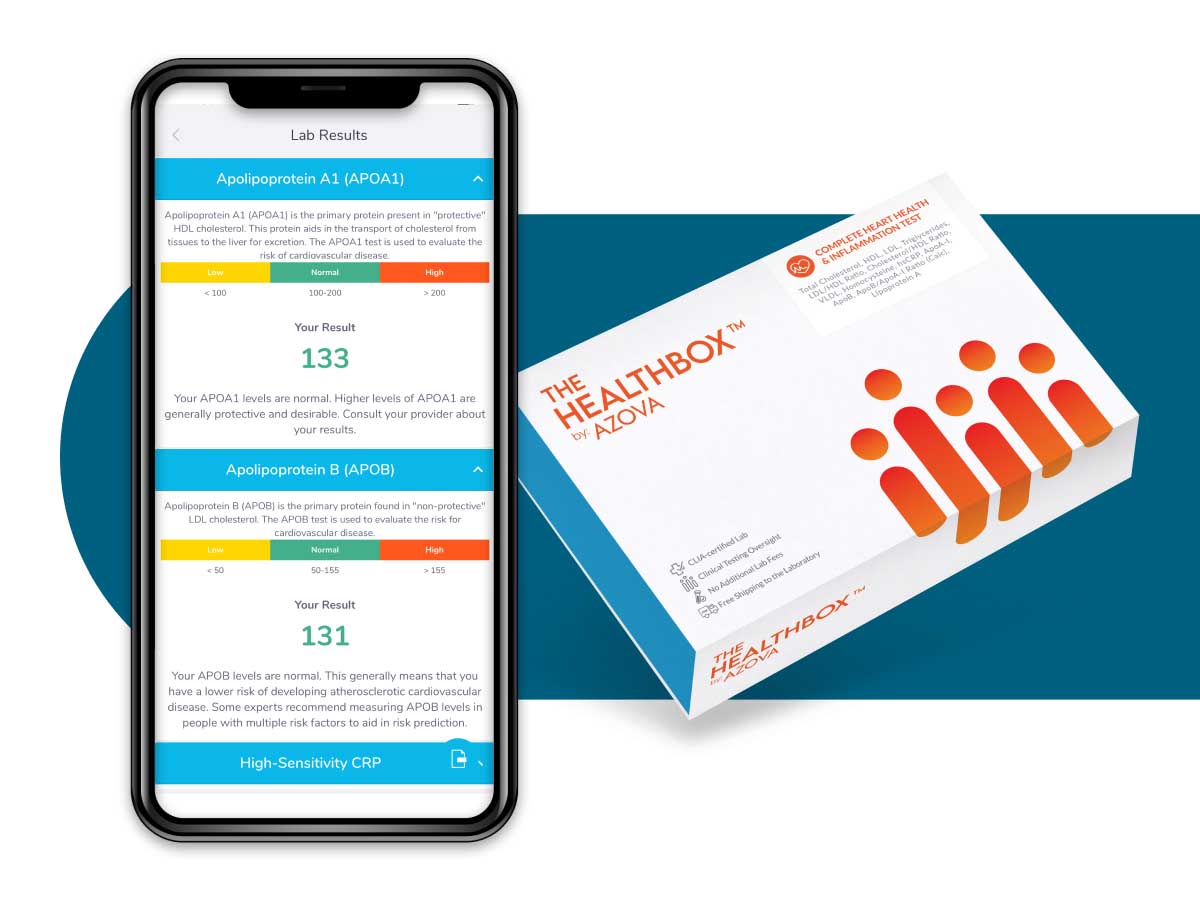
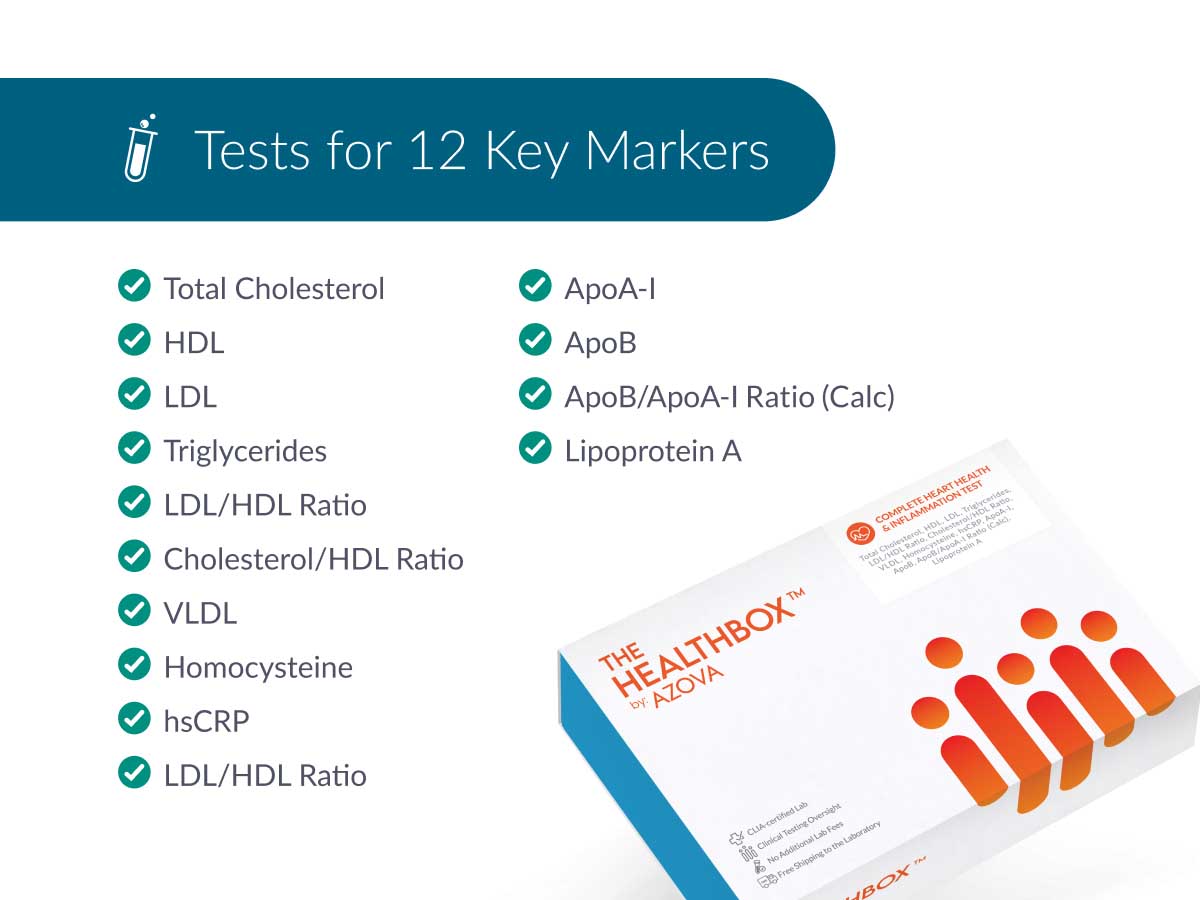
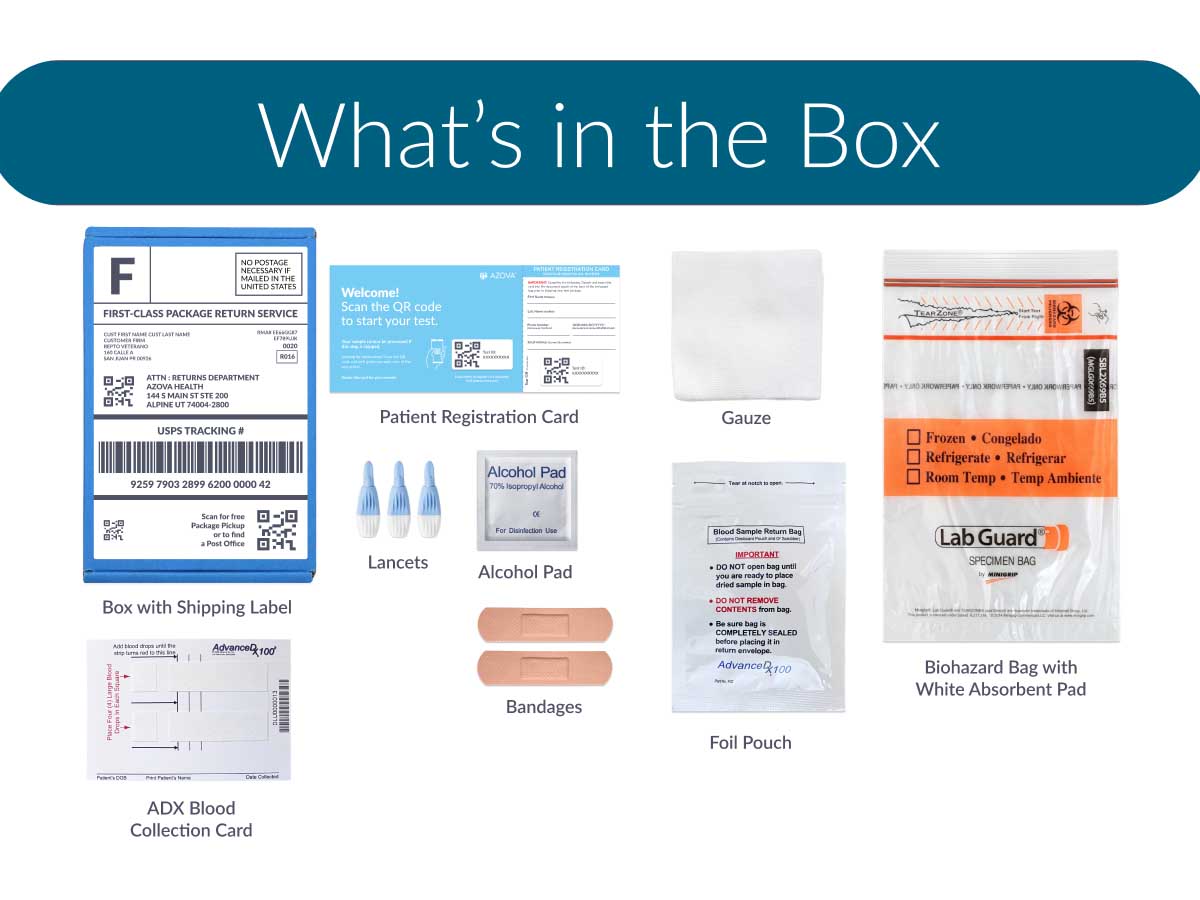
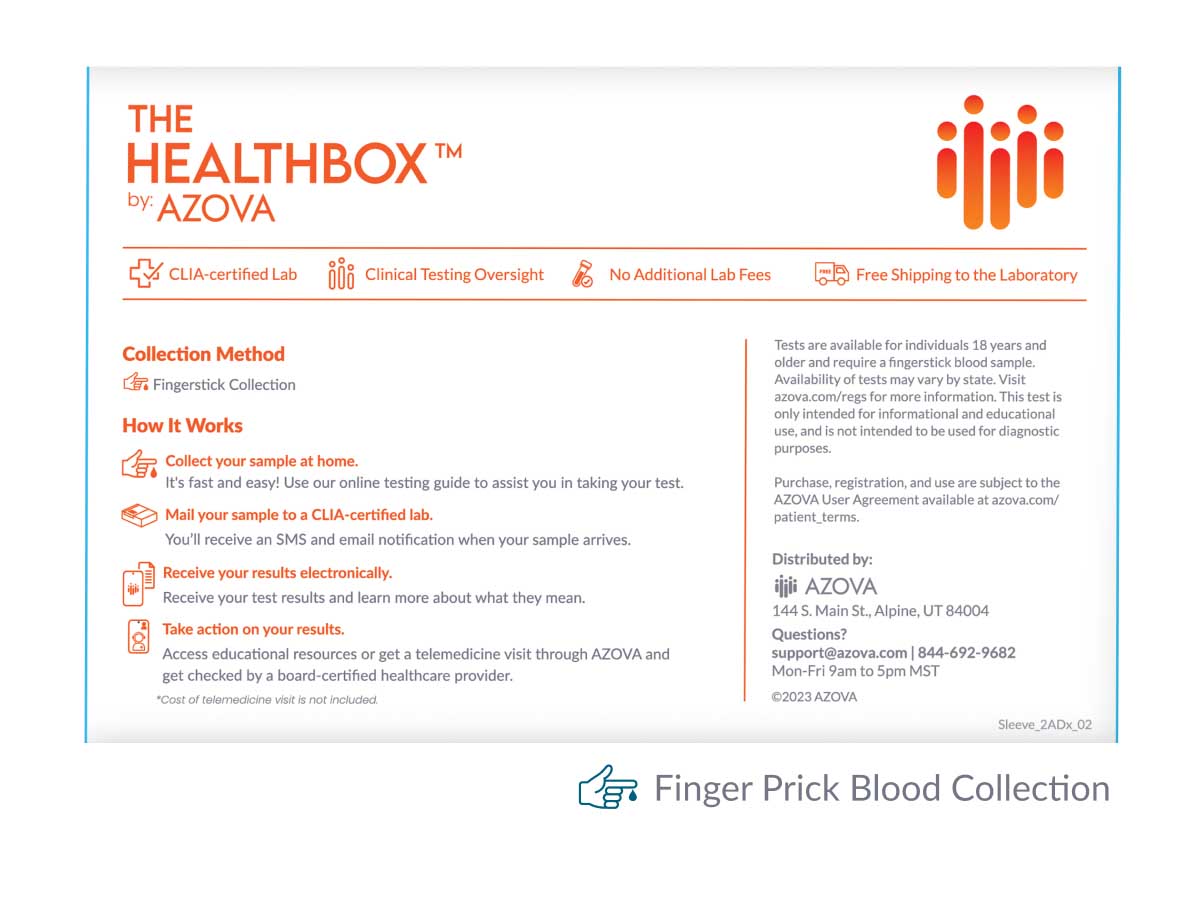
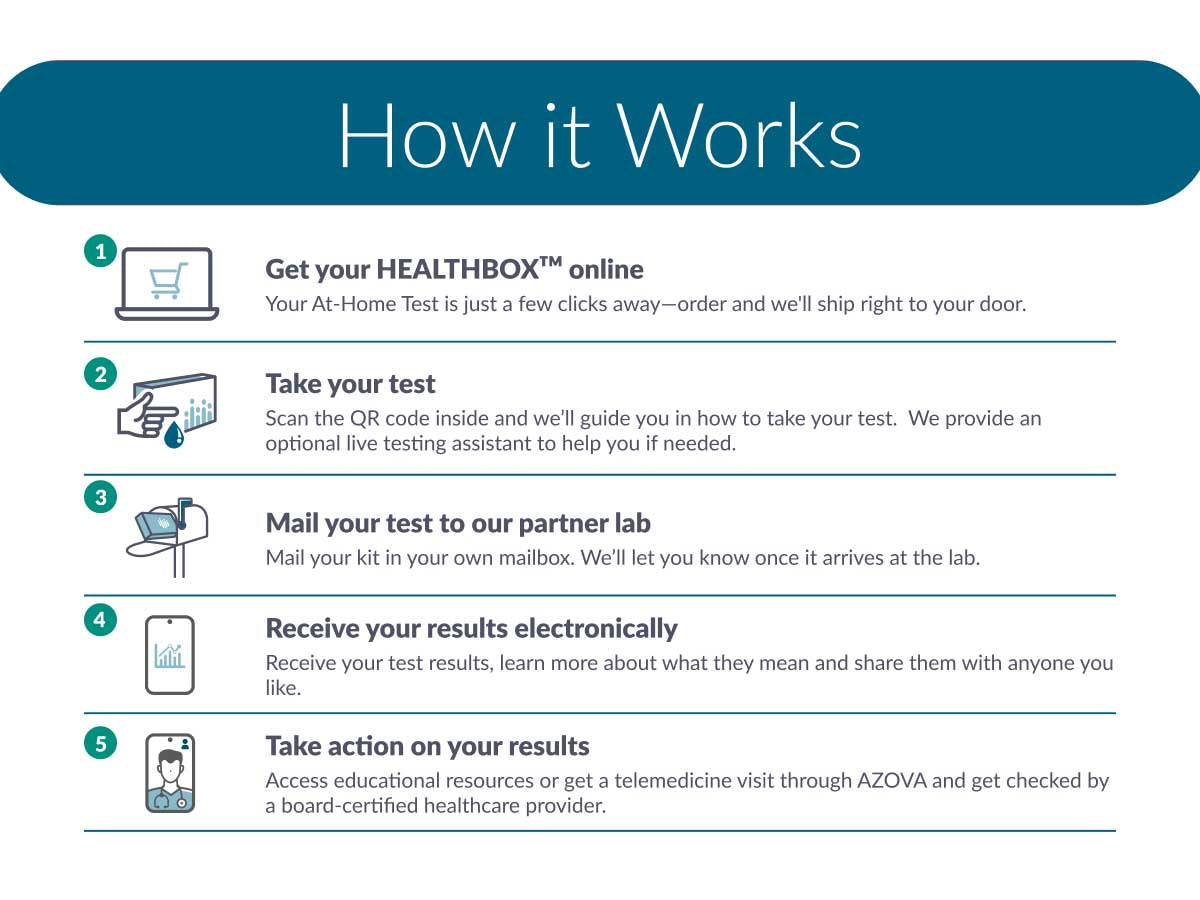
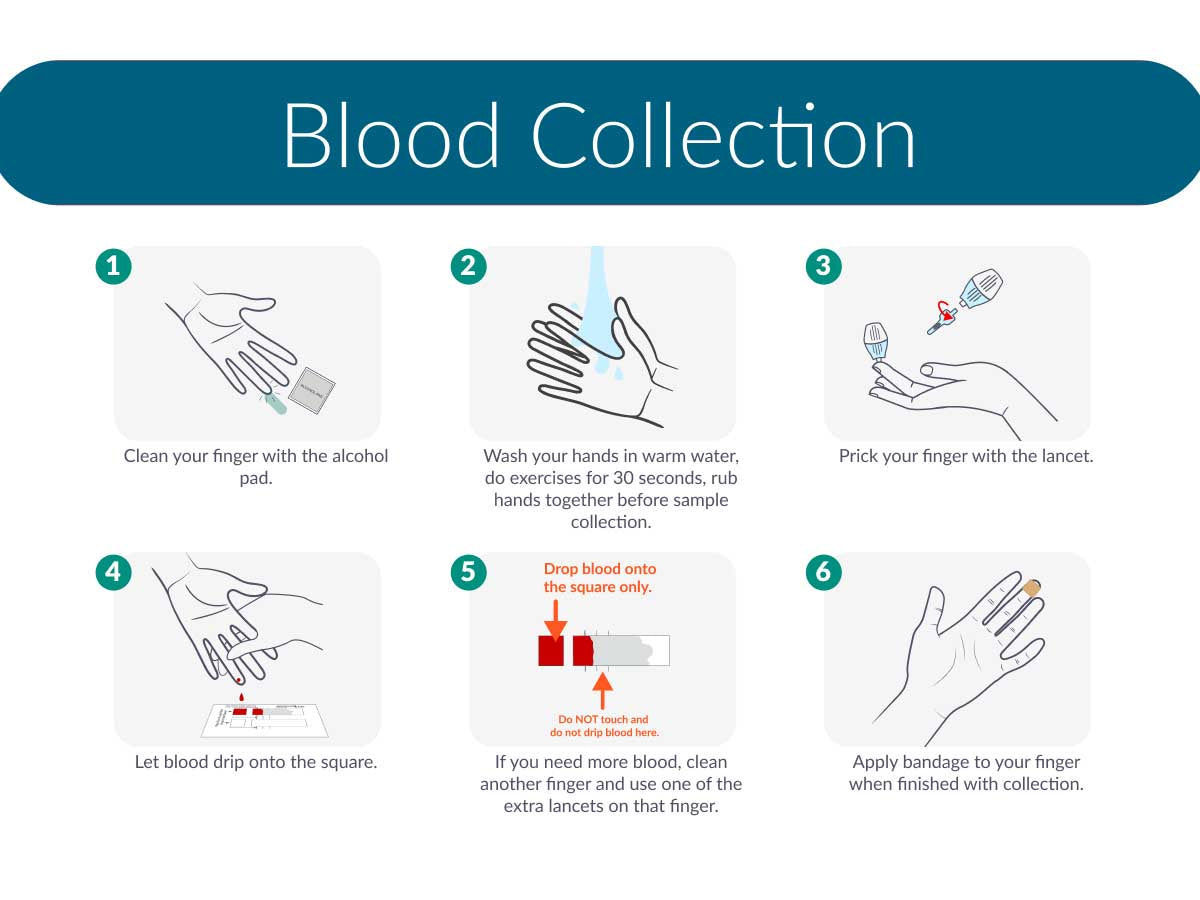
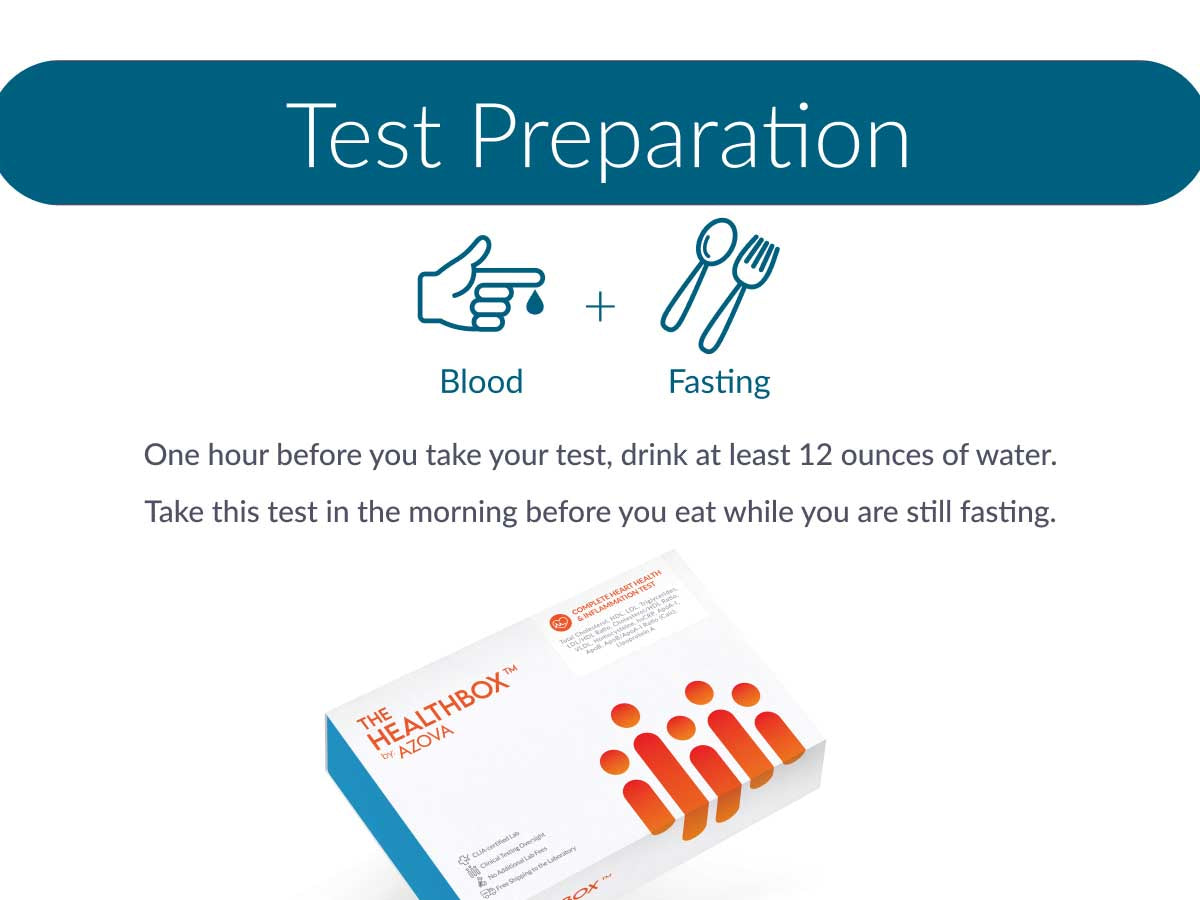
How it works
-
1
Collect your blood sample at home.
Fast and easy sample collection either with our online testing guide or virtual proctoring service.
-
2
Receive your results electronically.
Complete with a digital report that is printable in the AZOVA app.
-
3
Mail your sample to a CLIA-certified and CAP accredited lab.
You’ll receive an SMS and email notification when your sample arrives.
-
4
Take action on your results.
Access our educational materials or get a virtual care visit with a certified health provider (cost not included).
Frequently asked questions
Are AZOVA tests covered by FSA/HSA?
- Use your AZOVA test order confirmation to submit for FSA/HSA reimbursement.
- As defined by the IRS, many FSA/HSA benefits coordinators consider AZOVA tests to be qualified medical expenses.
- However, some FSA/HSA benefits coordinators might deny reimbursement. Before purchasing, please consider checking with your benefits coordinator to see if your FSA/HSA covers AZOVA products.
Who should take this test?
Men and women age 18+:
Cholesterol levels can increase with age, putting everyone at risk
Increased risks:
With a family history of heart disease, stroke, high blood pressure, diabetes, or obesity
Proactive approach:
People concerned about their heart health
What if I have questions about this test or my results?
For questions about your test or results, contact AZOVA Customer Support at 844-692-9682, available 24/7.
For a more in-depth discussion of your results with a healthcare provider, AZOVA's Virtual Care is available at azova.com for an additional cost.
How often should I take this test?
It is recommended to take this test every 6 months to 1 year, depending on your individual risk factors.
In which states can I purchase this test?
Tests are available for individuals 18 years and older and require a blood sample. Availability of tests may vary by state. Visit azova.com/states for more information. This test is only intended for informational and educational use, and is not intended to be used for diagnostic purposes.
Purchase, registration, and use are subject to the AZOVA User Agreement available at azova.com/patient-terms.
Information presented here is not intended to diagnose or treat any condition and is provided for educational purposes only. Always consult with your healthcare provider before making any healthcare decisions.
If you are having a life threatening emergency, please call 911 immediately.

Virtual care 24/7
Save time and money when you see a doctor online.
Get started for $59.

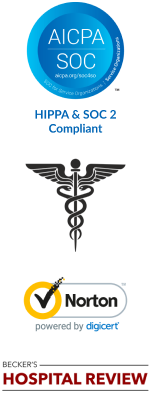
Talk with Customer Support
You can call AZOVA’s Customer Support team for comprehensive support, including help with your account, testing, results and telemedicine visits.
Please note that wait times may vary depending on call volume.
(844) 692–9682








